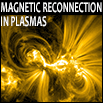Speaker
Alexandros Chasapis
(Laboratoire des Physiques des Plasmas)
Description
We present an in situ study of thin current sheets and associated
electron heating in
turbulent space plasma. We use Cluster observations made in the
turbulent plasma
downstream of the Earth's quasi-parallel shock and we analyze the
properties of
ion-scale current sheets. Intermittent structures were identified using
the Partial
Variance of Increments method. We studied the distribution of the
identified
structures as a function of their magnetic shear angle, the PVI index
and the
electron heating. We observed a distinct population of high PVI (<3)
structures that
accounted for ~20% of the total. Enhancement of the estimated
electron temperature
within these current sheets suggest that they are important for local
electron
heating and energy dissipation. Evidence of ongoing reconnection was
found in a
subset of this population. In those cases, multi-spacecraft observations
allow to
study electron distributions and wave activity at different locations
around the
x-line. We discuss the possible mechanisms of electron heating and
acceleration and
the role of thin current sheets for dissipation in turbulent reconnection.
Primary author
Alexandros Chasapis
(Laboratoire des Physiques des Plasmas)
Co-authors
Alessandro Retino
(Laboratoire des Physiques des Plasmas)
Andris Vaivads
(Swedish Institute of Space Physics)
David Sundkvist
(Space Sciences Laboratory)
Fouad Sahraoui
(Laboratoire des Physiques des Plasmas)
Luca Sorisso-Valvo
(IMIP-CNR)
Patrick Canu
(Laboratoire des Physiques des Plasmas)
Sergio Sevidio
(Dipartimento di Fisica, Universita della Calabria)
Yuri Khotyaintsev
(Swedish Institute of Space Physics)

